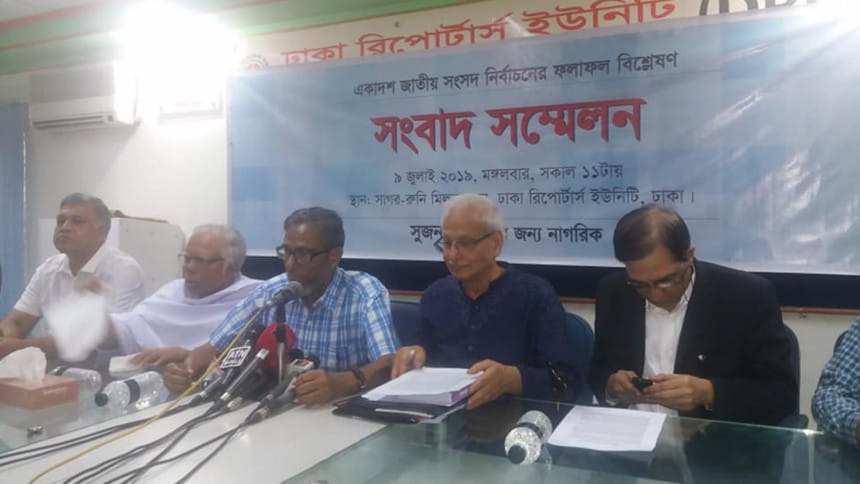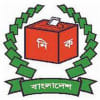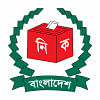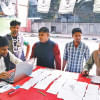Gross irregularities in Dec 30 polls

Election watchdog Shushashoner Jonno Nagorik (Shujan) yesterday alleged that the December 30 national polls, won by the ruling Awami League, was marred by massive irregularities.
Hundred percent turnout in polling stations, cent percent vote for AL MP contenders and “abnormal” vote difference between AL and Oikyafront candidates proved that irregularities indeed took place during the polls last year, it said.
At a press conference at the Dhaka Reporters’ Unity, Shujan also demanded formation of the Supreme Judicial Council to investigate the irregularities and take actions against those involved in them.
“We urge the president to form a Supreme Judicial Council in order to probe the irregularities and take measures against those involved, especially the Election Commission,” said Shujan Secretary Badiul Alam Majumdar.
Shujan President Hafizuddin Khan and eminent jurist Shahdeen Malik echoed Majumdar’s view while speaking at the briefing.
Asked about the allegation, Election Commissioner Rafiqul Islam said they organised a proper election.
“There is an election tribunal to deal with polls irregularities. The court can take any decision, it can even cancel any election,” he said.
At the press conference, Dilip Kumar Sarker, central coordinator of Shujan, said many allegations of irregularities, involving nomination trade, obstruction to polls campaign, assault of polling agents, stuffing of ballots the night before the election, barring voters from going to the voting booths and forcing people to vote for a particular party, surfaced after the polls.
“Following the review of the centre-wise results, all these allegations seem to be logical,” he said.
Shujan said data provided by the EC shows that 213 polling centres of 103 constituencies had 100 percent of the votes cast, which is unbelievable.
Of the 213 centres, AL candidates won in 181, Jatiya Party candidates in 21, BNP leaders in eight and others in three.
Dilip said it was not logical and acceptable that there would be 100 percent turnout.
Some of the enlisted voters had died, some were abroad while some could have been ill or away from their areas for emergency works during the election, he said.
Terming the cent percent votes being cast absurd, Shahdeen said, “None but a lunatic will say that people’s will was reflected in the election.”
Columnist Syed Abul Maksud said there had been no record of 100 percent turnout anywhere in history.
“No one will forgive the chief election commission … he will be questioned on the Day of Judgement,” he said.
Of the total 40,155 polling stations, 99 percent of the votes were cast at 127 centres, 98 percent at 204 centres, 97 percent at 358 centres and 96 percent at 516 stations, according to Shujan.
The polls watchdog also found that 100 percent of the votes were cast for a single symbol at 587 polling centres of 75 constituencies.
Of the 587 centres, all votes went for AL candidates in 586 centres. The other centre was won by a BNP contender.
AL leaders secured victory in 74 constituencies while the other one was won by a leader of the Workers Party of Bangladesh.
Shujan further alleged that it found discrepancies in the centre-wise results and those signed by returning officer (RO) in at least four constituencies.
For example, it said data provided by the RO showed that the turnout in Dhaka-10 was 69.92 percent. However, the centre-wise results showed it was 73.09 percent.
The case was similar in Chattogram 8.
The RO said 74.44 percent voters exercised their franchise, but the centre-wise data said the number was 76.72 percent.
Shahdeen said, “This shows that the Election Commission resorted to forgery in regard to the results.”
Badiul said, “We also found discrepancies in the information provided by returning officers and the EC. Which one will people believe?”
Also, Shujan officials said there was a huge difference in the turnout percentage between constituencies using Electronic Voting Machines (EVMs) and ballot papers.
The average turnout of the six constituencies where EVMs were used was 51.42 percent while it was 80.80 percent in the other 294 constituencies.
“Why is there such a difference? Is it because ballot stuffing could not take place in the constituencies where EVMs were used?” Badiul asked.
“The EC should come up with an explanation.”
Shujan also said BNP candidates got abnormally low percentage of vote in 16 constituencies where they had won four straight times in the past.
For example, BNP leaders won in Lakshmipur 1 and 3 in the national polls since 1991 to 2008. But in the December 30 election, candidates from the party got only 2.02 percent and 5.68 percent vote respectively.
BNP candidates did not get a single vote in 1,285 polling centres and less than one percent vote in 6,075 polling stations.
“It is believed that each of the Awami League and the BNP has support of 30 to 40 percent of the country’s people,” Badiul said.
Speaking at the briefing, local government expert Tofail Ahmed said, “Election Commission’s data is consistently inconsistent.”
He observed that EC should not be allowed to hold any elections unless the allegations against it were investigated.

 For all latest news, follow The Daily Star's Google News channel.
For all latest news, follow The Daily Star's Google News channel. 







Comments